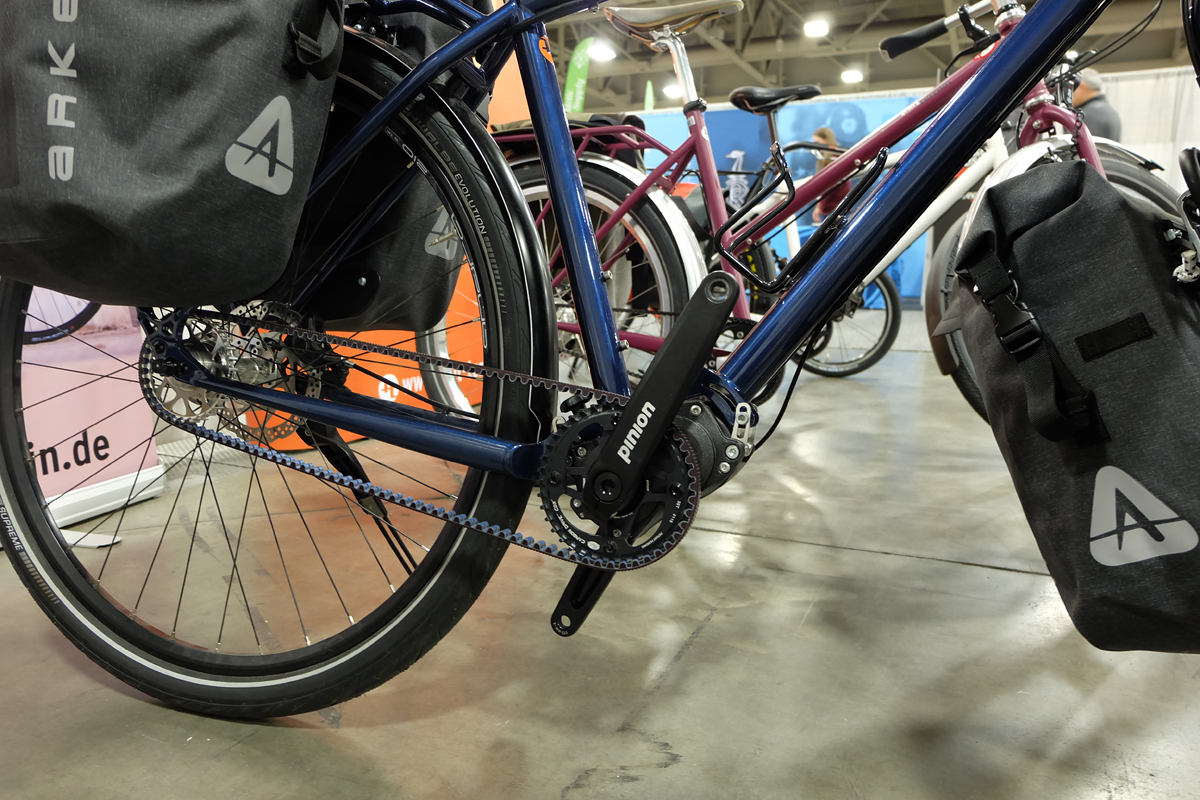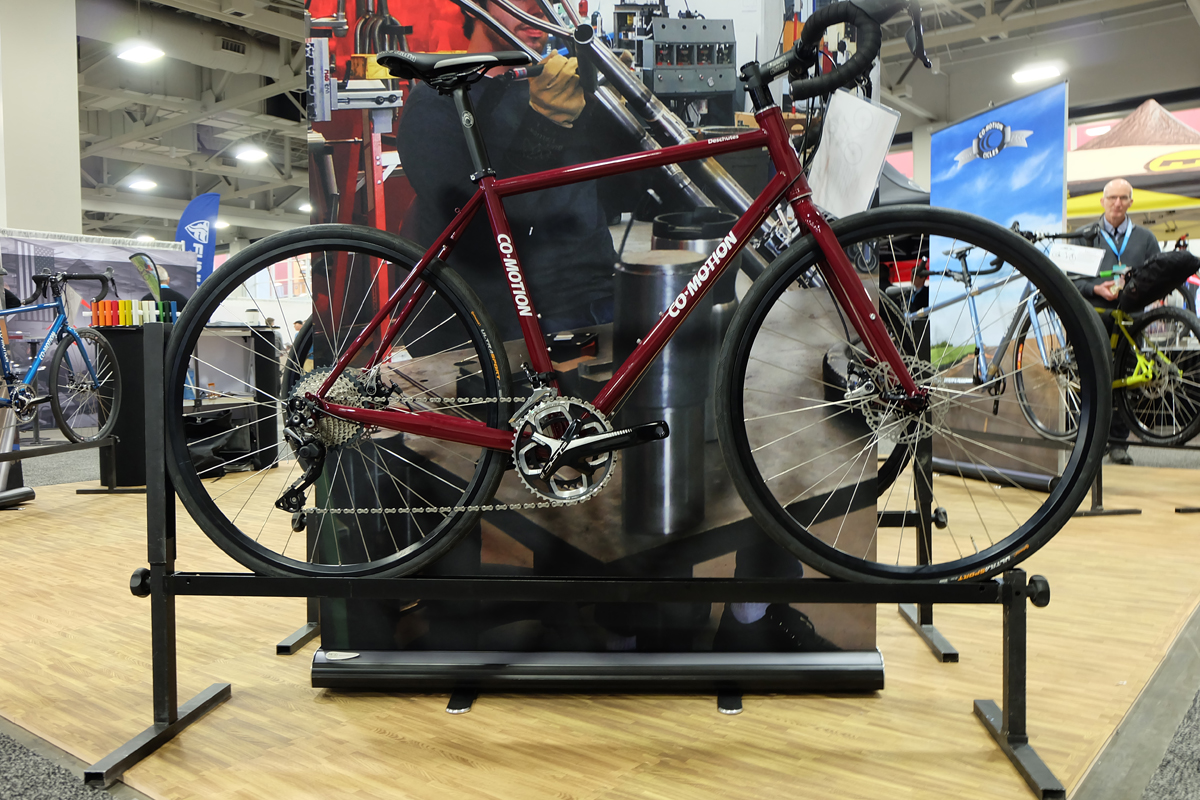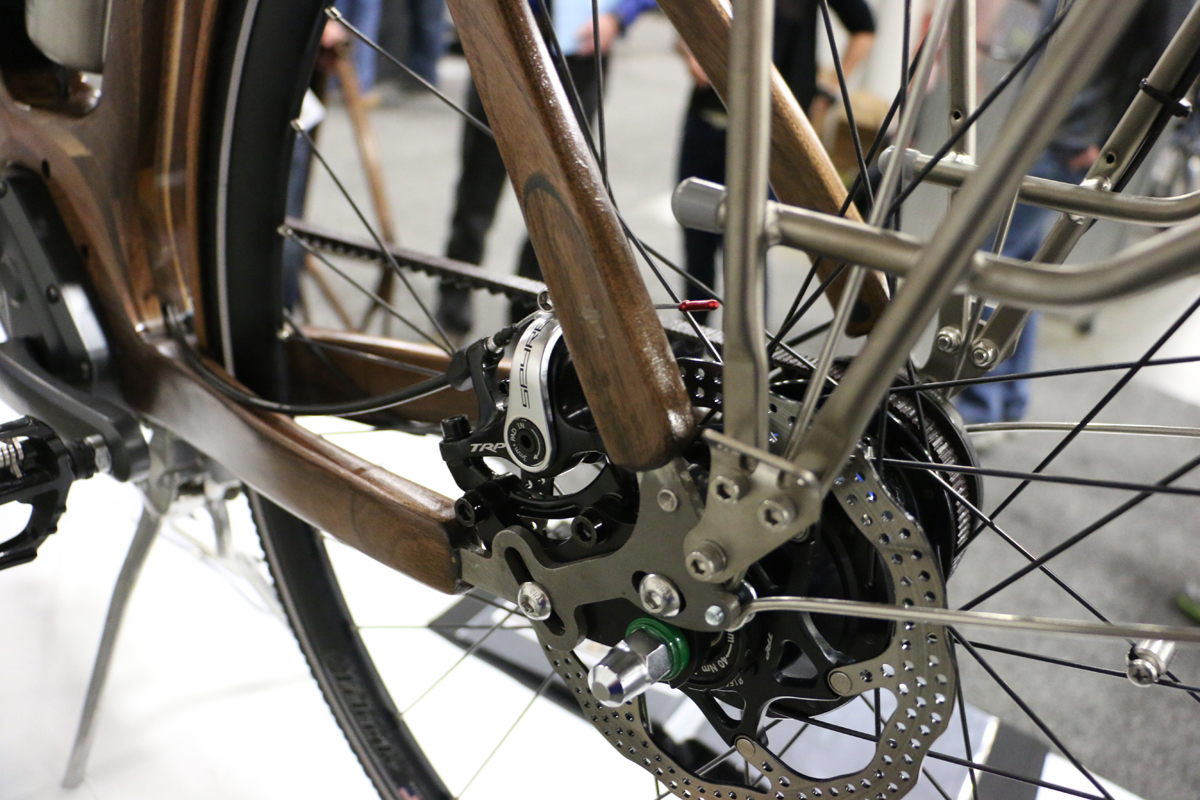[Editor’s Note: This article is about the 2017 NAHBS in Salt Lake City. Things are different now.]
By Lou Melini — The North American Handmade Bicycle Show (NAHBS) was held in Salt Lake City on March 10-12, 2017. There were numerous beautifully handcrafted bikes and accessories in front of my eyes. I was in a constant state of dehydration due to drooling over them. I went to the show specifically to look at bikes built specifically for commuting in style to work or around town. I also wanted to look at bikes that would take me out on the road or dirt path for a month long self-supported bike tour. Bikes fitting my interest were in the minority at the show, but there was enough of them to keep me busy for 2 of the 3 days. Touring bikes by Tout Terrain, Co-Motion and Steve Potts caught my eye. A wooden commuter bike (one of a number of bike companies working with wood or bamboo) also caught my eye. The Shimano booth had a couple of exquisite commuting bikes (without frame names) to show off their new commuter brake/drivetrain componentry.
Bicycles for Extended Touring
Tout Terrain (pronounced too-ter-ahn)
Tout Terrain brought a fleet of bikes and child carriers from Germany. In name recognition, Tout Terrain, is to German touring bikes what Ortlieb is to panniers. Their bikes have traveled around the world. A couple of Tout Terrrain bikes have been temporarily housed in my garage, owned by bike travelers that spent time as guests of Julie and I. Unique features of the Tout Terrain include a rear rack that is brazed onto the frame and a head tube stop so that in the event of the bike falling, the handlebar won’t hit the top tube. Drivetrain choices include a traditional cassette and rear derailleur, a Rolhoff rear hub or a Pinion gearbox that forms the bottom bracket plus a couple of other options. With a design that (I believe) is specific to Tout Terrain, the rear drop out can be changed to accommodate any drive train, including a single speed setup. You can also have lights powered by a dynamo front hub and The Plug USB charging port on the stem.

Every Tout Terrain is custom built in Freiburg, Germany. http://www.en.tout-terrain.de/bicycles/. The website currently lists 5 touring bikes for extended touring including the Silkroad and the Tanami. For ordering contact Cycle Monkey, www.Cyclemonkey.com, info@cyclemonkey.com or 510-868-1777 in Richmond, California (near Berkeley). For a more complete review of the Tanami look at the review in Adventure Cyclist: https://www.adventurecycling.org/adventure-cyclist/online-features/road-test-tout-terrain-tanami-xplore/.
Co-Motion
Eugene, Oregon based Co-Motion started in 1988, as I remember, as a maker of tandem bicycles. They have since expanded with bikes specific for nearly every use one can imagine on a bike. Their initial touring model, the Americano, is immensely popular. The Pangea with 26 “wheels, ridden for tens of thousands of miles by Park City’s Darren Alff of Biketouringpro.com fame (now DarrenAlff.com), followed the Americano. http://bicycletouringpro.com/new-touring-bicycle-comotion-pangea-black/ Co-Motion has recently introduced two new touring models, the small rider/women’s Ochoco with 650B wheels and the incredibly affordable Deschutes. For an off-road tour of the Great Divide trail consider the aptly named Divide bike.

I was a bit stunned when I looked at the Deschutes and then the price tag. How can this be? At only $2,495, this is a true touring bike, with appropriate gearing for extended tours, wheels that will withstand the rigors of a long tour, and the necessary braze-ons for racks, fenders and 3 water bottles. It has a traditional touring build with a shiny, tough paint job in everyone’s favorite color, Lusty Red. If you are thinking about a Surly Long Haul Trucker or something similar, stop for more than a moment and check out this bike. It will truly be worth your time and consideration.
With the price, one would think that Co-Motion is now making bikes overseas but the Deschutes is built in Oregon. The engineering of the frame was worked to minimize labor without affecting the Co-Motion quality and it shows in the frame. The show bike was beautiful. It comes in 5 sizes as a complete bike only. The drivetrain components are a combination of Shimano 105 (derailleurs/shifters) and FSA (crank) great choices given the price of the bike.
If you wish for a higher end component group, a custom fit, a Rolhoff hub or a choice of paint schemes, then look at the Americano that starts at $1965 for the frame. Other options for the Americano include a pinion gearbox, couplers so you can take apart your bike to fit in a suitcase, and a pathfinder package (Schmitt dynamo hub, lights, and USB port in the top cap of the stem). For smaller riders, the Ochoco has frame sizes down to 42 cm (50 cm top tube, 66.5 stand over height).
co-motion.com. Local Utah dealer Bingham Cyclery stocks Co-Motion. For dealer information in other areas go to http://co-motion.com/dealers
Bicycles for Commuting:
You may have noted that people bike to work on a variety of bikes, so defining what makes a bike a “commuter” primarily depends on its usage. There are many bikes that have been built with the necessary accessories for commuting, rear rack for carry stuff, dynamo hubs to provide power for lights, a Gates belt drive system to stay clean and ease maintenance and perhaps a pedal-assist battery to help you to get around quicker. But few commuters are built with the elegance of wood and that is what caught my attention at the Cedarville Wooden E-bike booth. There is even a GPS chip installed in the bike in case you lose it.
The Cedarville Wooden E-bike is a project bike from Cedarville University in Ohio. It is collaboration between the departments of Industrial Design, Engineering and Business. I spoke with Jay Kinsinger, the main person behind the project from the school of Engineering, Alejandro Camacho from the School of Business and Amy Sririntrachai, a senior student from the school of Industrial Design. She hails from Thailand, coming to Cedarville University to study Industrial Design, the current number 5 ranked school in that field of study.


There were over a half-dozen wood (and bamboo) bikes at the show, but the Cedarville bike was the only commuter model on display. Having never ridden a wooden bicycle, my first question was: “Why wood? I was told that wood is superior to carbon and metals at shock and vibration absorption. Wood also has a longer fatigue life than metals, it is a more sustainable product than metals or carbon and production processes with wood are less polluting than either metal or carbon. If you scratch the frame a little sanding and stain will bring it back to new.
The Cedarville project bike is not to be considered a one-time experimental project. The wooden bikes have over 4 years of field-testing including a cross-country trip on a wooden tandem by Mr. Kinsinger and his son. In the making of the show bike there were 8 engineering students involved in the process but Amy was the only industrial design student, a testimony to her talent. The bike was elegant and the booth was continually busy with visitors.
Eventually the Cedarville bike will be spun off into a separate company, so at this time there isn’t a website, though there are many articles when I Google “Cedarville Wooden Bikes”. For information on the bike you can contact kinsingj@cedarville.edu.
NAHBS Overview
The NAHBS primarily featured bicycles but there were many booths that featured accessories and bikes for specific needs. DirtySixer bikes are made for tall or large people. At this time the bikes are marketed to professional basketball players. Don Walker’s booth (one of the founders of the NAHBS) had a trike perfect for people that might have issues with balance and coordination and are unable to ride a 2-wheeled bike. Thompson had a flared handlebar, perfect for my touring bike, but unavailable until after July. Silca made a small, lightweight tool kit that would take the place of my currently multitool.
There were also several booths from local or regional companies. Blaze bicycles (Moab), Kelson (Rexburg, Idaho) and Sixth Law Cycles (Salt Lake City) as well as Mercury wheels are companies that I hope to talk about in future columns.
This is the first, and perhaps the last time, that the NAHBS will be in Salt Lake City. I made a pitch to Don Walker congratulating him on an excellent show and encouraged him to return. Utah bicycle enthusiasts will again fill the arena if it returns.
The 2018 show will be held in Hartford, Connecticut from February 16-18. For more information, see nahbs.com.







